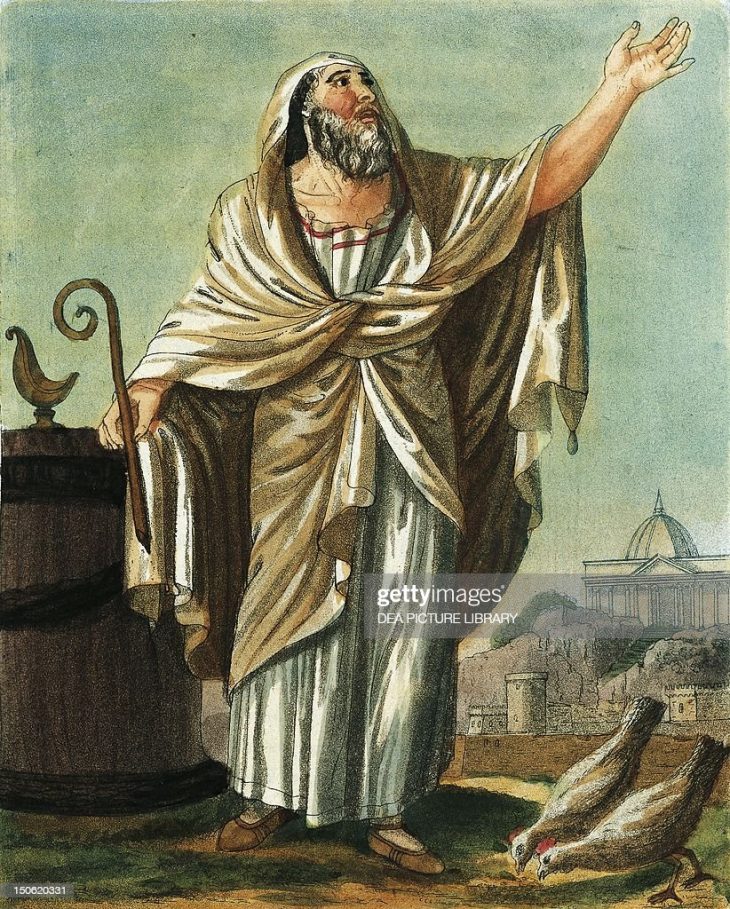
Word of the Day: Augur
Today’s word of the day, courtesy of Merriam-Webster, is augur. The verb means to “show or suggest, especially from omens, that something might happen in the future” (https://www.merriam-webster.com/word-of-the-day). It is frequently followed by an adverb, like “well” or “badly.” The origin of the word is, apparently, uncertain. Here is what you would find if you were to look up “augur” on etymonline.com:
“ancient Romans functionary whose duty was to observe and interpret auspices, or reputed natural signs concerning future events,” 1540s, from Latin augur, a religious official in ancient Rome, perhaps (de Vaan) originally meaning “an increase in crops enacted in ritual,” in which case it probably is from Old Latin *augos (genitive *augeris) “increase,” and is related to augere “increase” (from PIE root *aug- (1) “to increase”).
The more popular theory is that it is from Latin avis “bird,” because the flights, singing, and feeding of birds were important objects of divination (compare auspex). In that case, the second element would be from garrire “to talk.”
A related word is augury, which means a divination from auspices (https://www.merriam-webster.com/dictionary/auspice, see definition #3), or an omen, or a portent.
If you get an email from the On This Day website, you will see that it says that on this date in 1492 Christopher Columbus made the first not regarding tobacco. But if you look up the history of tobacco, you will see that it says that the note is dated 6 November 1492. Is On This Day wrong? Columbus described “…men and women with a half-burnt weed in their hands, being the herbs they are accustomed to smoke” (Cambridge University Press edition, 2010).
Well, not really. 1492 is almost 100 years before the Spanish converted from the Julian to the Gregorian calendar. The Julian calendar was gradually getting away from an accurate presentation of the seasons because it included too many leap days. It had one every four years, including the ones ending in two zeroes. In the Gregorian calendar, leap years occur in every year divisible by 4 or 400, except those years divisible by 100 but not 400. Pretty complicated, right? But the promise is that the Gregorian calendar won’t get off by any days for something like 3,300 years, by which time, if you believe the doomsayers, there will no longer be a need for a calendar.
So on or around this day, the native dwellers of the New World introduced tobacco to Columbus, who initially thought he was dealing with people from east Asia. And some of the Spanish took up the practice of smoking this weed. One guy took the practice home to Spain, but many people thought that a man blowing smoke out of his mouth and nose must be inhabited by Satan, so he spent several years in prison. Despite that, smoking tobacco became very popular in Europe. In testimony after Christopher Marlowe’s death, he was quoted as having said, “all they that love not tobacco & Boyes were fooles,” though Richard Baines, who quoted Marlowe, was not exactly a trustworthy character.
The CDC, not the most reliable source in the world, says the following:
Cigarette smoking causes about one of every five deaths in the United States each year.1,6 Cigarette smoking is estimated to cause the following:1
More than 480,000 deaths annually (including deaths from secondhand smoke)
278,544 deaths annually among men (including deaths from secondhand smoke)
201,773 deaths annually among women (including deaths from secondhand smoke)
Almost half a million Americans die from smoking related diseases, if the CDC numbers are to be believed. And my impression is that Europeans smoke more than Americans, so I imagine, without looking it up, that tobacco-related death is an even greater problem across the pond. But maybe not. China has, according to several sources, the largest population of smokers in the world. In fact, China has ten times as many smokers as the USA, so perhaps we can extrapolate and estimate that nearly ten million Chinese people die from smoking-related diseases every year.
I wonder how many people in the Old World and from the Old World have died prematurely from tobacco-related disease since that first notation in Christopher Columbus’s diary in 1492. I wonder if, way back in 1492, some Native American augur saw a portent of the effect of tobacco in the flight of birds.
The figure is, An augur, by Jacques Grasset de Saint-Sauveur (1757-1810), engraving from Ancient Rome, or The historical and pictorial description of everything related to the Roman people, their military, customs, religious and public life, 1825. (Photo by DeAgostini/Getty Images)